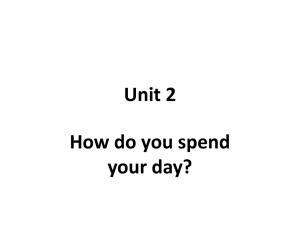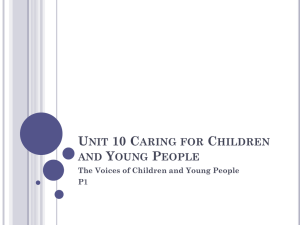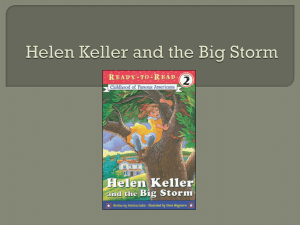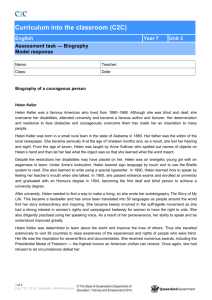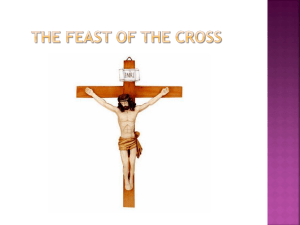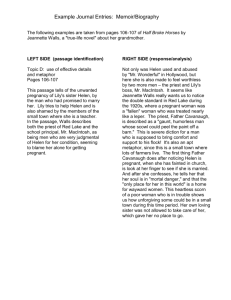The Bird Market - SaveAs Writers` Group
advertisement
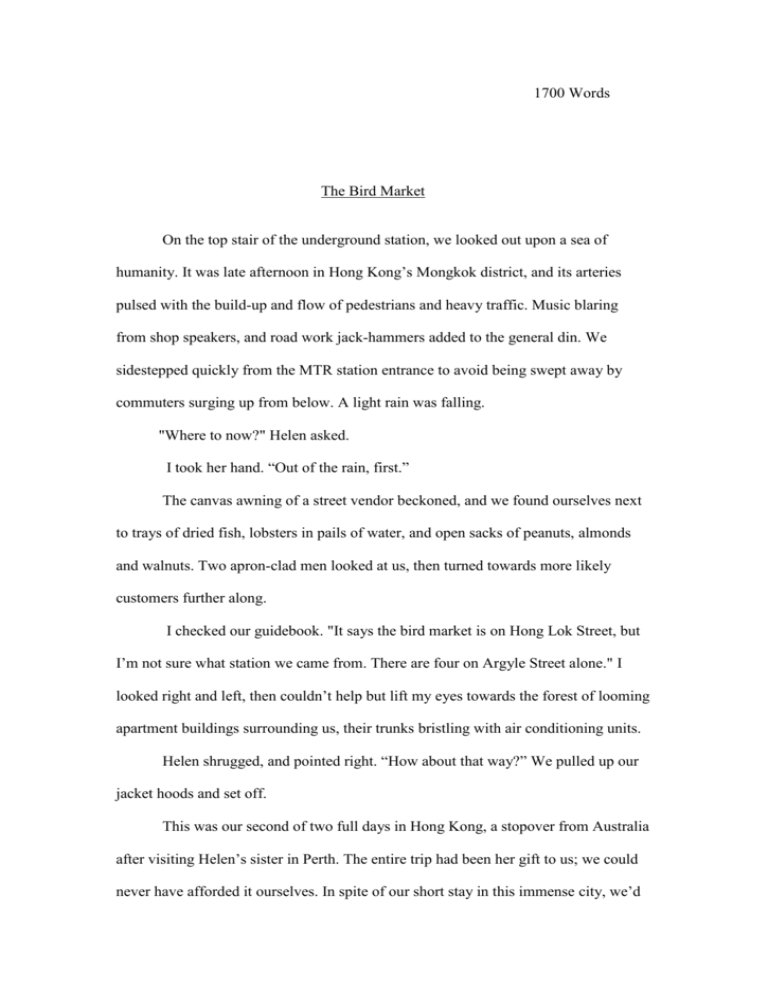
1700 Words The Bird Market On the top stair of the underground station, we looked out upon a sea of humanity. It was late afternoon in Hong Kong’s Mongkok district, and its arteries pulsed with the build-up and flow of pedestrians and heavy traffic. Music blaring from shop speakers, and road work jack-hammers added to the general din. We sidestepped quickly from the MTR station entrance to avoid being swept away by commuters surging up from below. A light rain was falling. "Where to now?" Helen asked. I took her hand. “Out of the rain, first.” The canvas awning of a street vendor beckoned, and we found ourselves next to trays of dried fish, lobsters in pails of water, and open sacks of peanuts, almonds and walnuts. Two apron-clad men looked at us, then turned towards more likely customers further along. I checked our guidebook. "It says the bird market is on Hong Lok Street, but I’m not sure what station we came from. There are four on Argyle Street alone." I looked right and left, then couldn’t help but lift my eyes towards the forest of looming apartment buildings surrounding us, their trunks bristling with air conditioning units. Helen shrugged, and pointed right. “How about that way?” We pulled up our jacket hoods and set off. This was our second of two full days in Hong Kong, a stopover from Australia after visiting Helen’s sister in Perth. The entire trip had been her gift to us; we could never have afforded it ourselves. In spite of our short stay in this immense city, we’d 2 done well up to now getting around. Weaving our way along the crowded pavements, we passed meat and produce shops, and open-air eateries. On tables were spread all sorts of seafood, including bowls of live crayfish, gills undulating. One owner clapped his hands, gesturing at empty eating tables. Our guidebook, an out-of-date, ex-library copy, listed the bird market as one of the top-ten highlights: “A singing street of our feathered friends.” Helen was keen to find it because, hinting to me earlier, she ‘had an idea.’ I spied a street sign, and checked the guidebook again. "Portland Street. Okay, Hong Lok should be just ahead.” Confidently, I led the way past a construction site surrounded by a bright, orange-coloured fence of corrugated iron. We reached the next street. It was not Hong Lok. "This is ridiculous!” Then it dawned on me that our destination lay behind the orange fence. “The map shows the market right there,” I said, dismayed. “It’s all been torn up.” Helen pointed across the street. "There's an alley over there. Maybe that’s another part of it?" The rain came down harder. We looked at each other from under our dripping jacket hoods. "We've come this far,” Helen grinned up at me. Traffic cleared briefly, so we dashed across and approached the alley. We found the name plate, in shadow under an awning: Hong Lok Street. Almost immediately we entered a gloomy, quieter world. Shop service entrances and concrete ramps were protected by metal awnings that formed a long, 3 makeshift roof for the street. Crates and heavy sacks were shifted about by workers who cast us brief glances. We stepped over water hoses, and nodded to a man throwing empty boxes into a skip. As a place for a relocated bird market, the alley looked anything but promising. We decided to see it thru to the next street, and only a bit further along came the unmistakeable chirping of birds. Helen winked at me. "Sounds like we found it." The street angled slightly to the right. Just beyond we came upon a wall made of cages: Stacks of bamboo and metal cages of varying sizes straddled a space between two buildings. The chirping of hundreds of tiny songbirds inside those cages evoked a freshness that belied its surroundings. We stood silently, taking in the scene. Two narrow aisles had been created between the stacks, joining another aisle at the back. Hanging from piping above, strands of bare light bulbs brightened some of the vibrantly coloured canaries and parakeets higher up, while resigning those lower down to a more gloomy obscurity. To our left, an elderly woman wearing a straw hat was sitting on a milk crate. "The market was supposed to run the length of a block," I muttered, regarding this dismal paradise. “I guess the others gave up.” I looked at Helen. She was staring straight ahead, studying the cages. The elderly woman, evidently the shopkeeper, was looking at us. She raised her hand, gesturing to us to go inside. When we did so, she got up and followed us in. I shuffled behind Helen, who progressed slowly, checking each cage: canaries, parakeets, cockatoos, non-descript brown and mottled birds, all prized by the locals as potential ‘harbingers of good fortune.’ Helen stooped towards the lowest cages on stacked palates, brushing a finger along the bars. "Hello, sweetie," she said to a scruffy little bird in a corner. 4 The shopkeeper stood behind us. I turned to her and smiled. She smiled back, and nodded. The odour of droppings pervaded the aisles, but Helen kept a slow, methodical pace, visiting as many birds as possible. I noted the absence of price tags on the cages. This became important when Helen said, "I want to buy two birds." "Really?" I said, though not surprised. Helen stooped again and put her hand on a metal cage at the bottom of a stack. She smiled at the shopkeeper, then looked at me. “These two. They need more light.” The shopkeeper came around me and knelt close to Helen. Touching the same cage, she gestured for Helen to stand up, then touched several, much higher cages. Helen gave the shopkeeper a determined smile, and pointed insistently at the lower cage. I leaned over and looked in at the two dull-yellow canaries, huddled together in shadow on their perch. A vague, irritated expression replaced the shopkeeper’s smile. She looked down at the lower cage, held up two fingers on one hand, and with the other flashed a few fingers several times. Unable to keep up, I pulled out a one-hundred Hong Kong Dollar note from my wallet, and held it up slightly. The elderly woman shook her head. I glanced at Helen, who grimaced back. Fifty dollars more. The woman nodded and accepted payment. We helped her unstack the cages, retrieve ours, and rebuild the wall. The poor birds involved in this reshuffle twittered and flitted about their tiny homes, sending downy feathers into the air. The elderly woman’s annoyed expression remained throughout this disruption. Once the small cage was in my arms, the woman vanished momentarily, then returned with a cardboard box. She took the cage from me, put it into the box, and gave it back to me. Her annoyed expression was gone. 5 “Thank you,” Helen said, smiling. The woman nodded, and returned the smile. Then we returned to Argyle Street. It was now early evening, and the traffic and crowds were heavier than ever. The rain had stopped and the sun had pushed through the clouds, heating up the humid air. We entered the MTR station we’d arrived from, and rush-hour’s human tide swept us along to the platform. The approaching train flew to a stop, aligning perfectly with the platform queue markers. We squeezed inside, the door grazing my back as it closed. Helen held onto me while I gripped the cardboard box. Several commuters around us carried on conversations with their phones. We couldn’t hear the birds. The MTR train roared south towards the harbour. We got out too soon, and made our way down tourist-choked Nathan Road, its neon signs exploding colour. We passed glittering arcades and restaurants, and the imposing Peninsula Hotel, where the day before we and hundreds of others paid too much for a cup of tea in its vast lobby – another ‘must-do’ in the guidebook. Crossing one last busy road, we finally reached the waterfront promenade. The waters of Victoria Harbour lapped the concrete wall below us. Beyond loomed Hong Kong Island’s myriad skyscrapers, their sharp angles softened by a haze infused with the gold of the setting sun. Tugboats steamed by on their way in from the China Sea. The round hulk of a green and white Star Ferry churned towards us, while another was just departing Kowloon. Dozens of people lined the long promenade railing. We moved to an empty stretch further up. I opened the cardboard box and removed the cage, holding it by a metal ring on its roof. The canaries huddled close together. They fluttered their wings, and one let out a tiny "Cheep." 6 “What do you think their chances are?” I asked. Helen smiled up at me. “Gerry, do you remember when you asked the doctor what your chances were?" I smiled back at her, and nodded. “Yes. I think they're going to be just fine.” "A group's headed this way,” Helen whispered, looking over my shoulder. “We'd better hurry." She leaned over the cage and we kissed. "To you and me, babe," she said with sparkling eyes. "To your being cancer-free. To new beginnings.” Helen pulled opened the cage door and stood back. The canaries didn't move. I shook the cage slightly, and one flew to the side, grasping the bars. "Cheep...cheep." "Try the top," Helen giggled. She looked passed me at the approaching group, then back at me, and began to laugh. Grasping the cage firmly with one arm, I gripped the bars on the roof and pulled hard. With a "pang" the roof popped up, almost hitting me in the jaw. Helen shrieked. In a cloud of flapping wings the canaries were off. We ran to the wall, wildly scanning the sky. Then Helen cried, "There they are! There they are!" The two tiny birds darted low over the water, then rose up, one following the other. Looping back, they landed on the promenade wall further down. Instantly they were off again, gliding in a wide arc away and towards the west over the harbour. They vanished, then briefly reappeared one last time, bobbing and weaving beneath the orange disk of the sun. It looked to us like they were having fun.


